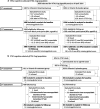Effect of vitamin D on cognitive decline: results from two ancillary studies of the VITAL randomized trial
- PMID: 34853363
- PMCID: PMC8636504
- DOI: 10.1038/s41598-021-02485-8
Effect of vitamin D on cognitive decline: results from two ancillary studies of the VITAL randomized trial
Abstract
Low vitamin D levels have been associated with cognitive decline; however, few randomized trials have been conducted. In a trial, we evaluated vitamin D3 supplementation on cognitive decline. We included participants aged 60+ years (mean[SD] = 70.9[5.8] years) free of cardiovascular disease and cancer in two substudies in the VITAL 2 × 2 randomized trial of vitamin D3 (2000 IU/day of cholecalciferol) and fish oil supplements: 3424 had cognitive assessments by phone (eight neuropsychologic tests; 2.8 years follow-up) and 794 had in-person assessments (nine tests; 2.0 years follow-up). The primary, pre-specified outcome was decline over two assessments in global composite score (average z-scores of all tests); substudy-specific results were meta-analyzed. The pooled mean difference in annual rate of decline (MD) for vitamin D3 versus placebo was 0.01 (95% CI - 0.01, 0.02; p = 0.39). We observed no interaction with baseline 25-hydroxyvitamin-D levels (p-interaction = 0.84) and a significant interaction with self-reported race (p-interaction = 0.01). Among Black participants (19%), those assigned vitamin D3 versus placebo had better cognitive maintenance (MD = 0.04, 95% CI 0.01, 0.08, similar to that observed for Black participants 1.2 years apart in age). Thus, vitamin D3 (2000 IU/day cholecalciferol) supplementation was not associated with cognitive decline over 2-3 years among community-dwelling older participants but may provide modest cognitive benefits in older Black adults, although these results need confirmation.Trial registration ClinicalTrials.gov; VITAL (NCT01169259), VITAL-DEP (NCT01696435) and VITAL-Cog (NCT01669915); the date the registration for the parent trial (NCT01169259) was submitted to the registry: 7/26/2010 and the date of first patient enrollment in either of the ancillary studies for cognitive function in a subset of eligible VITAL participants: 9/14/2011.
© 2021. The Author(s).
Conflict of interest statement
The authors declare no competing interests.
Figures
Similar articles
-
Effect of Long-term Vitamin D3 Supplementation vs Placebo on Risk of Depression or Clinically Relevant Depressive Symptoms and on Change in Mood Scores: A Randomized Clinical Trial.JAMA. 2020 Aug 4;324(5):471-480. doi: 10.1001/jama.2020.10224. JAMA. 2020. PMID: 32749491 Free PMC article. Clinical Trial.
-
Vitamin D supplementation vs. placebo and incident type 2 diabetes in an ancillary study of the randomized Vitamin D and Omega-3 Trial.Nat Commun. 2025 Apr 8;16(1):3332. doi: 10.1038/s41467-025-58721-6. Nat Commun. 2025. PMID: 40199888 Free PMC article. Clinical Trial.
-
Effect of Vitamin D3 Supplements on Development of Advanced Cancer: A Secondary Analysis of the VITAL Randomized Clinical Trial.JAMA Netw Open. 2020 Nov 2;3(11):e2025850. doi: 10.1001/jamanetworkopen.2020.25850. JAMA Netw Open. 2020. PMID: 33206192 Free PMC article. Clinical Trial.
-
Vitamin D supplementation for sickle cell disease.Cochrane Database Syst Rev. 2020 May 28;5(5):CD010858. doi: 10.1002/14651858.CD010858.pub3. Cochrane Database Syst Rev. 2020. PMID: 32462740 Free PMC article.
-
Vitamin D, Marine n-3 Fatty Acids, and Primary Prevention of Cardiovascular Disease Current Evidence.Circ Res. 2020 Jan 3;126(1):112-128. doi: 10.1161/CIRCRESAHA.119.314541. Epub 2020 Jan 2. Circ Res. 2020. PMID: 31895658 Free PMC article. Clinical Trial.
Cited by
-
Vitamin D and neurodegenerative diseases.Heliyon. 2023 Jan 12;9(1):e12877. doi: 10.1016/j.heliyon.2023.e12877. eCollection 2023 Jan. Heliyon. 2023. PMID: 36820164 Free PMC article. Review.
-
Severe Vitamin D Deficiency-A Possible Cause of Resistance to Treatment in Psychiatric Pathology.Medicina (Kaunas). 2023 Nov 21;59(12):2056. doi: 10.3390/medicina59122056. Medicina (Kaunas). 2023. PMID: 38138159 Free PMC article.
-
The Effect of Vitamin D3 Supplementation on the Incidence of Diagnosed Dementia Among Healthy Older Adults-The Finnish Vitamin D Trial.J Gerontol A Biol Sci Med Sci. 2025 Jun 10;80(7):glaf077. doi: 10.1093/gerona/glaf077. J Gerontol A Biol Sci Med Sci. 2025. PMID: 40243375 Free PMC article. Clinical Trial.
-
The associations of serum vitamin D status and vitamin D supplements use with all-cause dementia, Alzheimer's disease, and vascular dementia: a UK Biobank based prospective cohort study.Am J Clin Nutr. 2024 Apr;119(4):1052-1064. doi: 10.1016/j.ajcnut.2024.01.020. Epub 2024 Jan 29. Am J Clin Nutr. 2024. PMID: 38296029 Free PMC article.
-
Geographical variation in dementia prevalence across China: a geospatial analysis.Lancet Reg Health West Pac. 2024 Jun 13;47:101117. doi: 10.1016/j.lanwpc.2024.101117. eCollection 2024 Jun. Lancet Reg Health West Pac. 2024. PMID: 38974661 Free PMC article.
References
Publication types
MeSH terms
Substances
Associated data
Grants and funding
LinkOut - more resources
Full Text Sources
Medical


